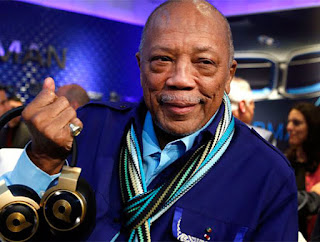Quincy Jones: We Have No Music Industry...
The following interview is from Fortune Magazine.com
Taylor Swift isn’t the only outspoken skeptic in the music industry. As legendary producer Quincy Jones tells it, the record biz is broken — though not beyond repair
Before Apple and Taylor Swift, and even the Moog synthesizer were born, there was Quincy Jones. Over the last six decades, the legendary composer and former record company exec has amassed 79 Grammy nominations (winning 27 actual awards) and produced hit albums like Michael Jackson’s Thriller.
Today, he is involved with several projects. One of his latest? An online music-learning tool called Playground Sessions, which recently kicked off a fundraising campaign via Crowdfunder.
But his role as co-creator of the self-proclaimed “Rosetta Stone” of music doesn’t mean he believes the Internet has had a positive affect on the record industry—a topic he remains as opinionated as ever about. Fortune caught up with Jones to ask for his take on new digital music distribution models and why he got involved with Playground Sessions.
Read below for an excerpt of the recent conversation.
FORTUNE: Is the music industry better or worse than it was 50 years ago?
Jones: Honey, we have no music industry. There’s 90% piracy everywhere in the world. They take everything. At the recent South by Southwest [an annual music festival in Austin], they had over 1,900 musicians, but fans didn’t know where to go. You can’t get an album out because nobody buys an album anymore.
F: What about some of the newer, online distribution models. Doesn’t that give artists more ways to get music to fans?
J: That doesn’t mean anything. They sell 4.5 million albums and they think it’s a hit record. It’s a joke. We used to do that [sell 4.5 million records] every weekend in the 80s. Today, you don’t get paid.
F: Why did you help create Playground Sessions?
J: You want to see kids getting into music instead of shooting each other. I’m very frustrated with America. After being creators of jazz and blues, we’re the only country in the world without a minister of culture. Americans don’t know the sources of their own music, from bebop to doo-wop to hip-hop.
We have only 12 notes. From Beethoven all the way to Bo Diddley, all of them had just 12 notes. That’s all we have and Playground Sessions is the perfect platform for teaching what we want to do with them.
F: Do you remember learning music?
J: Of course. I started at age 13 in Seattle, and met Ray Charles when he was 17. He was an amazing musician. It was never about money or fame back then. We just thought about what gave us goosebumps.
F: You must get requests from various music start-ups and projects. How do you decide which ones to pick?
J: I just go with Malcolm Gladwell’s book — Blink. And I’m not one of those “back in the days” kind of guys. I think when it all pools together it [the music industry] will be twice as good. And Playground Sessions will help bring it all together, it’s all there.






